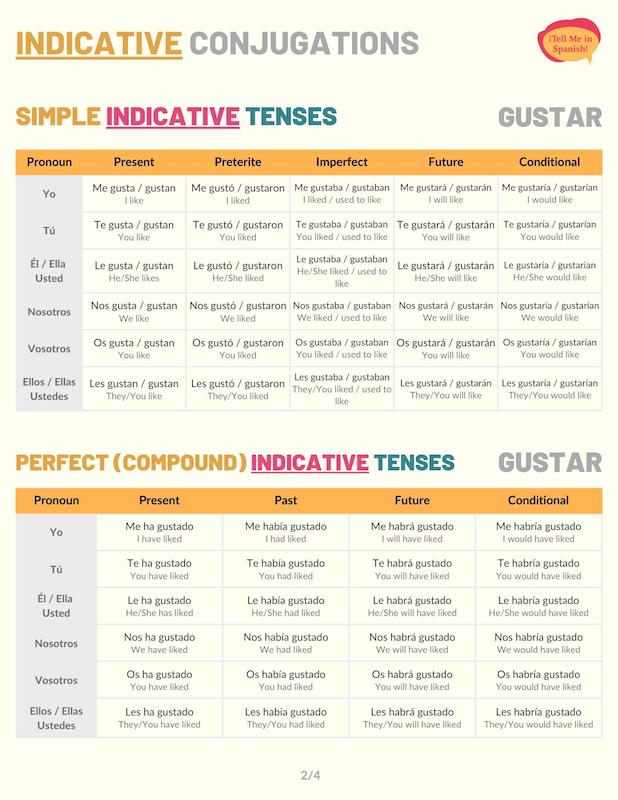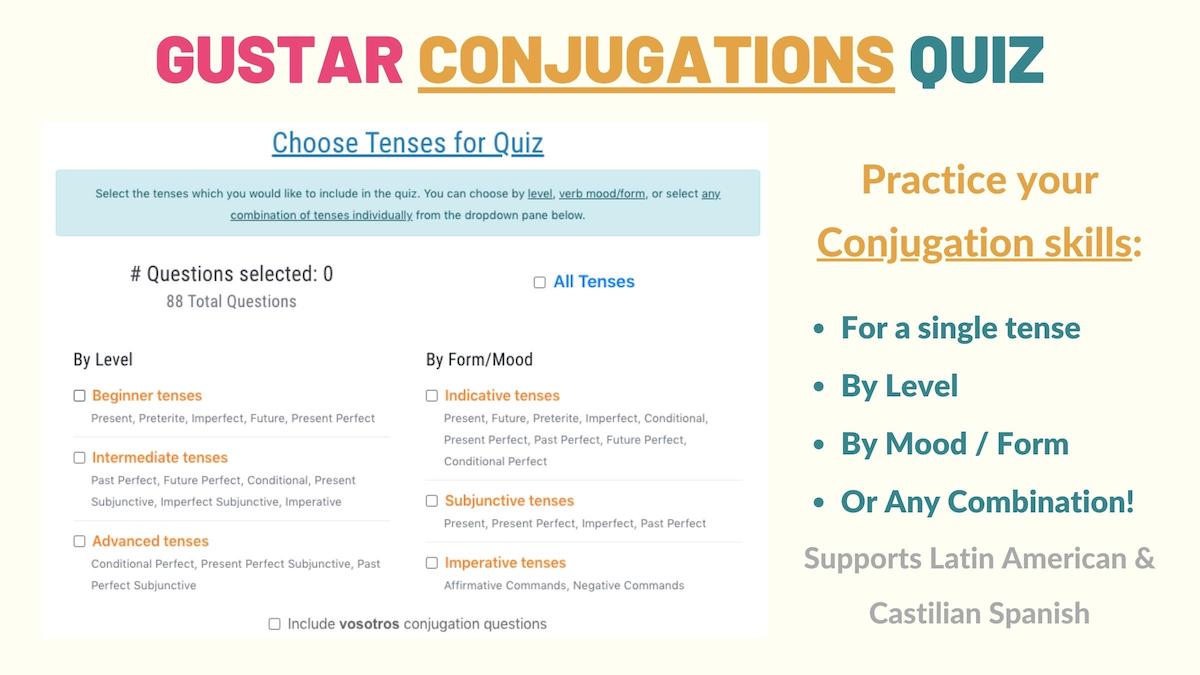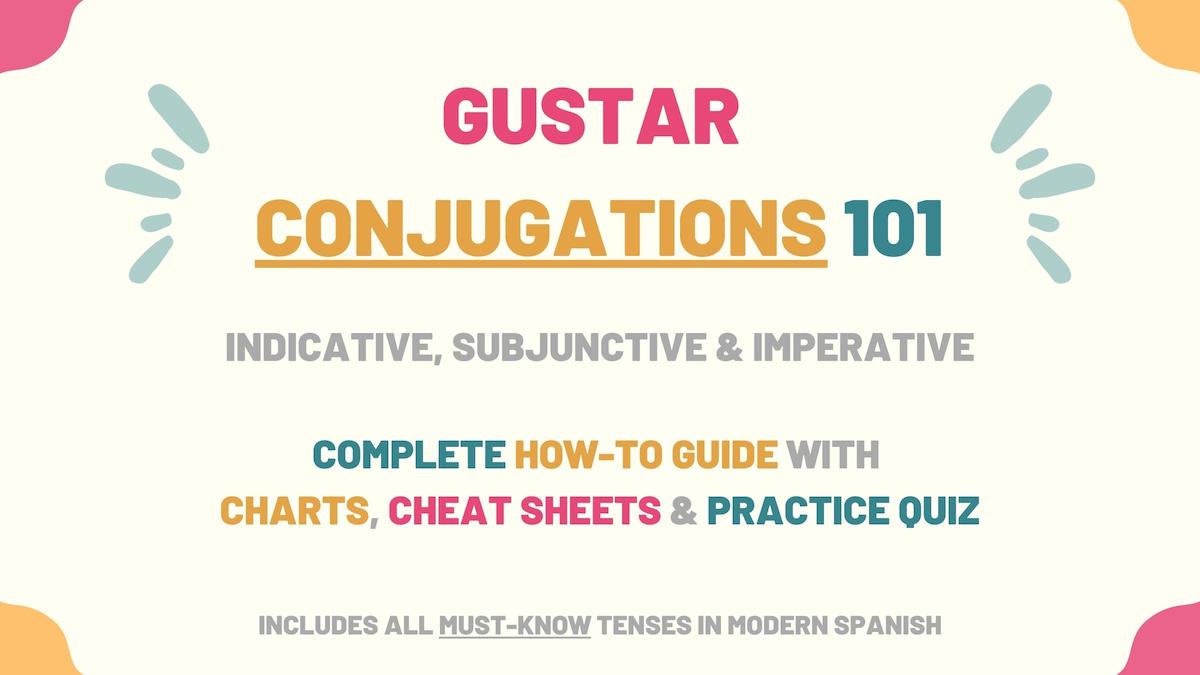Gustar conjugation patterns can be challenging to understand. However, in Spanish, many verbs work like gustar. Since it’s so important to understand, in this article you’ll learn how to conjugate this verb to the Spanish tenses you need to know. Here is an overview of what we’ll review:
- Gustar Overview
- Indicative Tenses of Gustar Conjugations
- Subjunctive Tenses of Gustar Conjugations
- Imperative (Commands) of Gustar Conjugations
- Uses & Examples
- Download Gustar Conjugation Tables & Uses Cheat sheets
- Gustar Conjugation Practice Quiz
Overview of Gustar
| Verb Characteristic | Property |
|---|---|
| Verb Type | -AR |
| Irregular | No |
| Infinitive | Gustar |
| Gerund (Present Participle) Form | Gustando |
| Past Participle Form | Gustado |
| Synonyms | Caer bien, encantar, agradar, llamar |
Take Note: Like other verbs in Spanish, gustar is conjugated based on the subject. However, affective verbs express that the subject causes a reaction or emotion. Prepositional and indirect object pronouns say who likes or dislikes something. Since they’re more common, we have only included singular and plural conjugations.
Indicative Conjugations of Gustar
Present tense
Gustar conjugation in the present tense allows you to talk about the things or activities people currently like. You can see how to form this tense in the gustar conjugation chart below. Here is an example: A mí me gusta leer.
| Person | Conjugation | Translation |
|---|---|---|
| Yo | Me gusta / gustan | I like |
| Tú | Te gusta / gustan | You like |
| Él / Ella Usted | Le gusta / gustan | He/She likes You (formal) like |
| Nosotros | Nos gusta / gustan | We like |
| Vosotros | Os gusta / gustan | You like |
| Ellos / Ellas Ustedes | Les gustan / gustan | They like You (plural) like |
Preterite tense
The gustar preterite conjugations refers to things or activities someone liked. Since it’s more frequently used to talk about activities and hobbies, the following preterite conjugation charts only have singular and plural forms.
For instance: A ella no le gustó la película.
| Person | Conjugation | Translation |
|---|---|---|
| Yo | Me gustó / gustaron | I liked |
| Tú | Te gustó / gustaron | You liked |
| Él / Ella Usted | Le gustó / gustaron | He/She liked You (formal) liked |
| Nosotros | Nos gustó / gustaron | We liked |
| Vosotros | Os gustó / gustaron | You liked |
| Ellos / Ellas Ustedes | Les gustó / gustaron | They liked You (plural) liked |
Imperfect tense
Use gustar’s imperfect tense conjugations to talk about what or whom you used to like. This verb is conjugated based on the person or thing you’re referring to and follows a regular -AR conjugation pattern. For instance: Hace muchos años, tú me gustabas mucho.
| Person | Conjugation | Translation |
|---|---|---|
| Yo | Me gustaba / gustaban | I liked I used to like |
| Tú | Te gustaba / gustaban | You liked You used to like |
| Él / Ella Usted | Le gustaba / gustaban | He/She liked He/She used to like You (formal) liked You (formal) used to like |
| Nosotros | Nos gustaba / gustaban | We liked We used to like |
| Vosotros | Os gustaba / gustaban | You liked You used to like |
| Ellos / Ellas Ustedes | Les gustaba / gustaban | They liked They used to like You (plural) liked You (plural) used to like |
Near future
The present forms of ir + a + gustar are the elements you must use to create the immediate future in Spanish. These conjugations of ‘gustar’ convey that a person will like something soon. For instance: A mi mamá no le va a gustar lo que hiciste.
| Person | Conjugation | Translation |
|---|---|---|
| Yo | Me va a gustar / van a gustar | I’m going to like |
| Tú | Te va a gustar / van a gustar | You’re going to like |
| Él / Ella Usted | Le va a gustar / van a gustar | He/She is going to like You (formal) are going to like |
| Nosotros | Nos va a gustar / van a gustar | We’re going to like |
| Vosotros | Os va a gustar / van a gustar | You’re going to like |
| Ellos / Ellas Ustedes | Les va a gustar / van a gustar | They’re going to like You (plural) are going to like |
Future simple tense
When conjugated to future simple tense, gustar communicates that a person will like something. Here is an example: Siempre me gustarán los perros.
| Person | Conjugation | Translation |
|---|---|---|
| Yo | Me gustará / gustarán | I will like |
| Tú | Te gustará / gustarán | You will like |
| Él / Ella Usted | Le gustará / gustarán | He/She will like You (formal) will like |
| Nosotros | Nos gustará / gustarán | We will like |
| Vosotros | Os gustará / gustarán | You (formal) will like |
| Ellos / Ellas Ustedes | Les gustará / gustarán | They will like You (plural) will like |
Conditional tense
The conditional conjugation of gustar is used to talk about what a person would like. In daily conversations, these forms allow you to ask people politely if they would like to do something. For example: ¿Te gustaría ir al cine conmigo?
| Person | Conjugation | Translation |
|---|---|---|
| Yo | Me gustaría / gustarían | I would like |
| Tú | Te gustaría / gustarían | You would like |
| Él / Ella Usted | Le gustaría / gustarían | He/She would like You (formal) would like |
| Nosotros | Nos gustaría / gustarían | We would like |
| Vosotros | Os gustaría / gustarían | You would like |
| Ellos / Ellas Ustedes | Les gustaría / gustarían | They would like You (plural) would like |
Present perfect tense
The present perfect in Spanish is formed by using an indirect object pronoun + haber present conjugations + gustado. Use these gustar conjugations to refer to what someone has liked. Check this example: Nunca me han gustado los mariscos.
| Person | Conjugation | Translation |
|---|---|---|
| Yo | Me ha gustado / han gustado | I have liked |
| Tú | Te ha gustado / han gustado | You have liked |
| Él / Ella Usted | Le ha gustado / han gustado | He/She has liked You (formal) have liked |
| Nosotros | Nos ha gustado / han gustado | We have liked |
| Vosotros | Os ha gustado / han gustado | You have liked |
| Ellos / Ellas Ustedes | Les ha gustado / han gustado | They have liked You (plural) have liked |
Take Note: When it comes to the perfect tenses, Spanish indirect object pronouns must always be placed before the verb haber.
Past perfect
Gustar conjugations in the past perfect indicative tense allow you to talk about what or whom someone had liked before a past reference point. For example: Hasta este momento, nunca me habían gustado los tacos.
As shown in the gustar conjugation chart below, this tense is built with haber imperfect forms + a past participle verb (gustado, in this example).
| Person | Conjugation | Translation |
|---|---|---|
| Yo | Me había gustado / habían gustado | I had liked |
| Tú | Te había gustado / habían gustado | You had liked |
| Él / Ella Usted | Le había gustado / habían gustado | He/She had liked You (formal) had liked |
| Nosotros | Nos había gustado / habían gustado | We had liked |
| Vosotros | Os había gustado / habían gustado | You had liked |
| Ellos / Ellas Ustedes | Les había gustado / habían gustado | They had liked You (plural) had liked |
Future perfect
Conjugate the verb gustar to the future perfect tense to express that a person will have liked something by or before a moment in the future. Here is an example: No sé si te habrá gustado lo que te mandé.
| Person | Conjugation | Translation |
|---|---|---|
| Yo | Me habrá gustado / habrán gustado | I will have liked |
| Tú | Te habrá gustado / habrán gustado | You will have liked |
| Él / Ella Usted | Le habrá gustado / habrán gustado | He/She will have liked You (formal) will have liked |
| Nosotros | Nos habrá gustado / habrán gustado | We will have liked |
| Vosotros | Os habrá gustado / habrán gustado | You will have liked |
| Ellos / Ellas Ustedes | Les habrá gustado / habrán gustado | They will have liked You (plural) will have liked |
Conditional perfect
In Spanish, the conditional perfect conjugation for gustar refers to what a person would have liked. For example: Nos habría gustado tener más tiempo libre.
| Person | Conjugation | Translation |
|---|---|---|
| Yo | Me habría gustado / habrían gustado | I would have liked |
| Tú | Te habría gustado / habrían gustado | You would have liked |
| Él / Ella Usted | Le habría gustado / habrían gustado | He/She would have liked You (formal) would have liked |
| Nosotros | Nos habría gustado / habrían gustado | We would have liked |
| Vosotros | Os habría gustado / habrían gustado | You would have liked |
| Ellos / Ellas Ustedes | Les habría gustado / habrían gustado | They would have liked You (plural) would have liked |
Progressive tenses
When combined with a present participle verb (gustando), the conjugations of estar allow you to form the progressive tenses. In Spanish, we use these conjugations to convey that someone is or was liking something. No me está gustando lo que dices.
| Progressive Tense | Formula | Translation Example |
|---|---|---|
| Present | (Indirect Object Pronoun) + estar (present) + gustando / gustando | I am liking |
| Preterite | (Indirect Object Pronoun) + estar (present) + gustando / gustando | You were liking |
| Imperfect | (Indirect Object Pronoun) + estar (present) + gustando / gustando | He was liking |
| Future | (Indirect Object Pronoun) + estar (present) + gustando / gustando | We will be liking |
| Conditional | (Indirect Object Pronoun) + estar (present) + gustando / gustando | They would be liking |
Take Note: Object pronouns can be attached to the present participle. You should check the rules to place indirect object pronouns in Spanish to improve your fluency.
Gustar Subjunctive Conjugations
In Spanish, the subjunctive tenses are used to refer to someone’s advice, recommendations, wishes, doubts, hypothetical situations, and expectations. The following gustar conjugation charts will help you learn the patterns to conjugate this verb to the subjunctive tenses.
Present subjunctive
Use the gustar present subjunctive conjugation to demand or hope a person likes something. For instance: Te compré estos chocolates, espero que te gusten.
| Person | Conjugation | Translation |
|---|---|---|
| Yo | Me guste / gusten | I like |
| Tú | Te guste / gusten | You like |
| Él / Ella Usted | Le guste / gusten | He/She likes You (formal) like |
| Nosotros | Nos guste / gusten | We like |
| Vosotros | Os guste / gusten | You like |
| Ellos / Ellas Ustedes | Les guste / gusten | They like You (plural) like |
Present perfect subjunctive
Haber present subjunctive conjugations + gustado are the elements you must use for forming the present perfect subjunctive tense. Use these gustar’s conjugations to convey uncertainty or wish someone has already liked something. ¿Recibieron las galletas? Ojalá les hayan gustado.
| Person | Conjugation | Translation |
|---|---|---|
| Yo | Me haya gustado / hayan gustado | I have liked |
| Tú | Te haya gustado / hayan gustado | You have liked |
| Él / Ella Usted | Le haya gustado / hayan gustado | He/She has liked You (formal) have liked |
| Nosotros | Nos haya gustado / hayan gustado | We have liked |
| Vosotros | Os haya gustado / hayan gustado | You have liked |
| Ellos / Ellas Ustedes | Les haya gustado / hayan gustado | They have liked You (plural) have liked |
Imperfect subjunctive
In Spanish, we use the imperfect subjunctive conjugations of gustar to refer to past suggestions, demands, or hopes you had about someone liking something. For example: No esperaba que la película les gustara tanto.
Castilian and Latin American Spanish use different endings for the imperfect subjunctive:
Latin American Spanish version
| Person | Conjugation | Translation |
|---|---|---|
| Yo | Me gustara / gustaran | I liked |
| Tú | Te gustara / gustaran | You liked |
| Él / Ella Usted | Le gustara / gustaran | He/She liked You (formal) liked |
| Nosotros | Nos gustara / gustaran | We liked |
| Ellos / Ellas Ustedes | Les gustara / gustaran | They liked You (plural) liked |
Note: Vosotros is not used in Latin America. As a result, the gustar conjugation for this pronoun has not been included in the previous chart.
Castilian Spanish version
| Person | Conjugation | Translation |
|---|---|---|
| Yo | Me gustase / gustasen | I liked |
| Tú | Te gustase / gustasen | You liked |
| Él / Ella Usted | Le gustase / gustasen | He/She liked You (formal) liked |
| Nosotros | Nos gustase / gustasen | We liked |
| Vosotros | Os gustase / gustasen | You liked |
| Ellos / Ellas Ustedes | Les gustase / gustasen | They liked You (plural) liked |
Past perfect subjunctive
In Spanish, the past perfect subjunctive is used to talk about what people would have liked. If applicable to your sentence, you can add conditions. Here is an example: Me hubiera gustado conocer a tu familia.
| Person | Conjugation | Translation |
|---|---|---|
| Yo | Me hubiera gustado / hubieran gustado | I had liked |
| Tú | Te hubiera gustado / hubieran gustado | You had liked |
| Él / Ella Usted | Le hubiera gustado / hubieran gustado | He/She had liked You (formal) had liked |
| Nosotros | Nos hubiera gustado / hubieran gustado | We had liked |
| Vosotros | Os hubiera gustado / hubieran gustado | You had liked |
| Ellos / Ellas Ustedes | Les hubiera gustado / hubieran gustado | They had liked You (plural) had liked |
Gustar Imperative Conjugations
The imperative mood in Spanish is used to command people to perform or not perform an action. These conjugations of gustar are not common because we cannot command people to like or dislike something.
Meanings of Gustar & Examples
Now that you’ve learned how to conjugate gustar (and similar verbs), you should check some examples of how to use this verb. Here is how you form sentences with gustar.
[Indirect object pronoun] + [gustar conjugated] + [subject]
¿Por qué te gustan tanto los carros?
Why do you like cars so much?
A mi mamá le gusta ver televisión.
My mom likes watching TV.
Luis, siempre me has gustado.
Luis, I have always liked you.
Creo que no les va a gustar este platillo.
I don’t think they are going to like this dish.
As shown in the examples above, the conjugation of gustar varies depending on the subject that caused an emotion in someone. Check #1. Since cars are plural, gustar is conjugated in plural form. Indirect object pronouns introduce the person who is feeling that emotion.
Take Note: A mí, a ti, a ella and similar terms are known as prepositional pronouns in Spanish. In this case, we use them with indirect object pronouns to emphasize and replace who likes or dislikes something. If this information is unclear, you must mention who you’re talking about (a mi mamá, a Luis, etc.)
Download Gustar Conjugation Charts & Uses Cheat sheet

Gustar is one of the most important and common -AR verbs that Spanish beginners need to learn. Since it’s an affective verb, it follows a completely different conjugation pattern than most verbs. I’ve created a cheat sheet PDF you can download which has all the gustar conjugation charts complete with examples so you can start applying this verb to your daily Spanish conversations.
Practice Quiz: Gustar Conjugation

Now that you’ve seen the most important tenses to conjugate gustar in Spanish, it’s critical that you practice your new knowledge and commit it to memory. This will help you get comfortable with all verbs like gustar where where you need to include Spanish indirect object pronouns. So, feel free to take the gustar conjugation practice quiz now.



